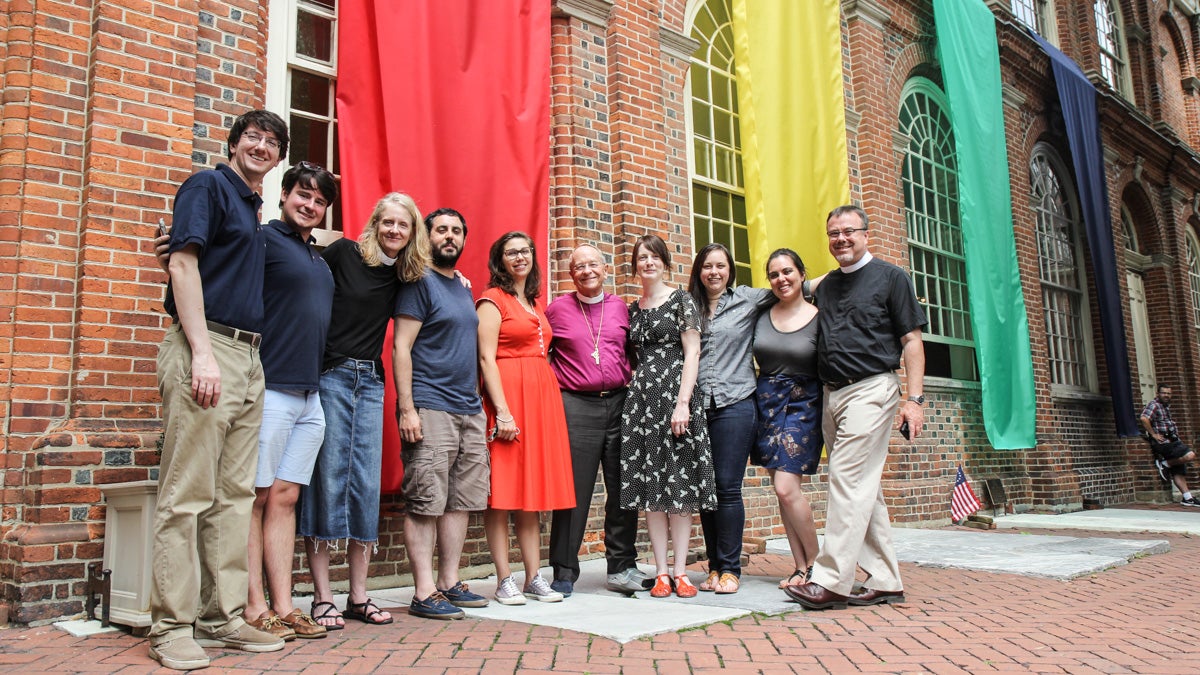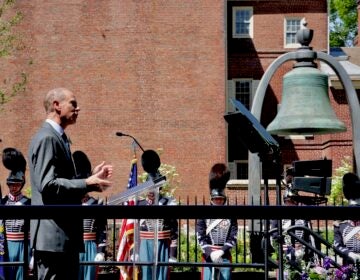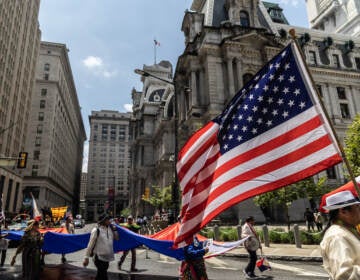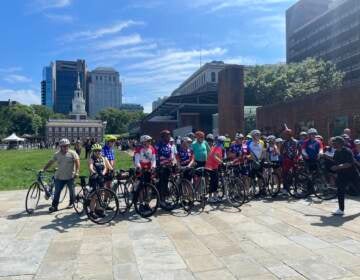Moral power of LGBT community winning against religious opposition
Self-examination is a prerequisite of coming out, and the moral power of that act is the foundation of all of our victories. I think we should claim that moral power.

Members of the Christ Church community pose with Bishop Gene Robinson before an interfaith ceremony in July. The author stands at the far left. (Kimberly Paynter/WHYY, file)
Speak Easy is examining priorities among LGBT communities in the Philadelphia region that persist beyond the issue of same-sex marriage. Seeking diverse perspectives on these issues, NewsWorks is hosting a public forum, “LGBT Priorities Beyond Marriage,” on Sept. 15 at WHYY studios. Registration is free at whyy.org/speakeasy.
—
When Christ Church hosted an interfaith service as part of the 50th anniversary of the first gay rights marches at Independence Hall, it was truly a celebration — not only of a deeply important anniversary, but also of the U.S. Supreme Court’s week-prior decision to make marriage legal throughout our country. It was a great time to be alive and to be in that location, celebrating with a community of people who were all equally and unreservedly happy.
Christ Church is sometimes called “the Nation’s Church.” That may sound presumptuous, but it is part of Independence National Historical Park. If you’re in Philadelphia and you want to go somewhere where all the founders were, your only choice besides Independence Hall is Christ Church.
Seats that had once been occupied by the members of the Continental Congress and the Constitutional Convention were now occupied by a joyous crowd listening to a gay bishop, a lesbian rabbi and a transgender muslim leader. The best part about this story is that it does not represent a discontinuity. Christ Church is not simply an historic site. It is an operating church. It sheltered an urban congregation amidst the bustle of Philadelphia in 1776 and 1787, and it remains an urban congregation amidst the bustle of Philadelphia today. The particular American religious tradition that was founded there made marriage part of its canons the same week everything else had happened.
But not everyone, everywhere, was celebrating. The rolls of rainbow cloth that hung from our second-story windows that day generated praise — but also complaints. Some people were quite vocally unhappy that a national landmark — a church in particular — was draped with the rainbow the day before the Fourth of July. We know that opposition to our civil rights has been and remains concentrated among religious people. There are various ways to soft-pedal this, but it is true.
For this reason, although not every member of our community is interested in religion, every member of our community seems aware of it. Within just the last few weeks, I have seen both “Pope Francis” and “Kim Davis” at local drag shows.
For some of us, interest in religion is mostly about knowing the enemy. But others may be found in every conceivable religious tradition, and I am among those who would argue that being gay can actually confer some — dare I say it — spiritual benefits. A spiritual life is, among other things, a life of self-examination, and self-examination is something many of us are quite good at. Our community won the moral marriage argument against so many entrenched religious interests because we, as individuals, have been waging the battle for a long time. Self-examination is a prerequisite of coming out, and the moral power of that act is the foundation on which all of our victories are built, going all the way back to those first gay rights marches at Independence Hall. Others may disagree, and certainly not every member of our community should do the same thing, but I think we should claim that moral power.
Later this month, the head of the Roman Catholic Church will visit this city. He is scheduled to give a speech from Independence Hall. This speech, I understand, is about religious freedom, a concept that many under his authority misrepresent as a defense for bigotry. He will be here to attend the World Meeting of Families, a conference that explicitly rejects our families. Is this man a moral leader? We have the experience to know that the answer to that question does not depend on his title or the size of his fan base. It depends on the quality of his moral reasoning. It depends on the outcome of that moral reasoning. It depends on how he treats others.
One of the continuing obligations of our community is to remind people of precisely that.
—
John Bright is a Ph.D student in religion at Temple University. He earned a master’s degree in religion from the Lutheran Seminary in Mount Airy, Philadelphia. John works for the Christ Church Preservation Trust. Part of Independence National Historical Park, Christ Church is intertwined with more of the founders than any other private institution of the Revolutionary era. Christ Church hosted the interfaith service that was part of this year’s fiftieth anniversary celebrations of the first gay rights marches at Independence Hall. John constructed an additional official event at the church addressing the common misperception that if the the founders were alive today, they would be religions and political conservatives by today’s standards.
WHYY is your source for fact-based, in-depth journalism and information. As a nonprofit organization, we rely on financial support from readers like you. Please give today.





